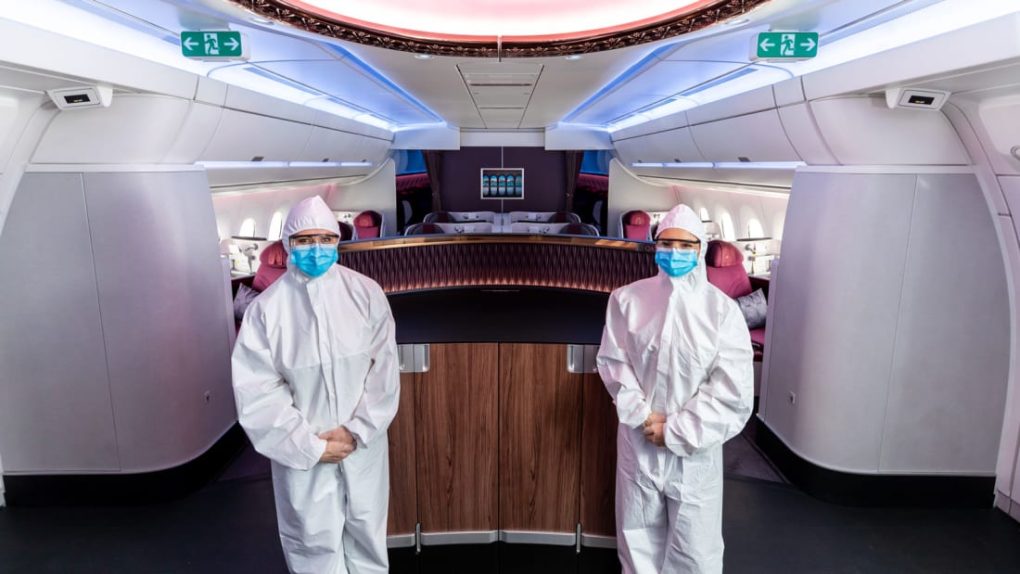- Some airlines will have cabin crews wearing personal protective equipment (PPE) and will implement other safety measures to reduce the risk of COVID-19 transmission.
- The novel coronavirus pandemic has grounded international flights for months, but as countries start to reopen, some people will start flying again.
- Qatar Airways is the latest company to announce the introduction of hazmat suits for its flight attendants on all of its flights. Passengers will have to wear face masks.
- Visit BGR’s homepage for more stories.
Airlines will bend over backward to tell you how they’re improving safety during the coronavirus pandemic. The truth is that we have no idea whether those fancy HEPA filters that completely cycle the air in the cabin every two to four minutes can actually eliminate the risk of COVID-19 infection. But it’s still refreshing to know that such filtration systems are in place. Add to that social distancing measures inside airports combined with temperature screening, and flying can get safer.
Also, the use of face masks could further reduce transmission inside the cabin, as could the extensive use of disinfectants on frequently touched surfaces. And, going forward, don’t be surprised to see some flight attendants wearing the same hazmat suits you see in reports about doctors and nurses fighting COVID-19 on the front lines.
Personal protective equipment (PPE) was a controversial subject in the early days of the pandemic, as governments raced to secure enough masks, suits, and visors to meet the needs of hospitals. Even so, medical professionals around the world complained about the lack of PPE at the start of local outbreaks.
Things have improved significantly and will continue to improve. That’s probably why some airlines have decided to equip their personnel with hazmat suits going forward. Such is the case for Qatar Airways, which will give its cabin crews PPE suits throughout the coronavirus pandemic. All flight attendants will wear a hazmat suit over their regular uniforms, goggles, gloves, and a face mask, per CNN Travel.
The prospect of having a person in full hospital gear provide service during a flight might sound terrifying, but it’s for the best. PPE use will not just protect the flight attendants, but also the passengers. After all, flight attendants are a category of workers that are regularly exposed to the risk of COVID-19 transmission given the nature of their job. Research from cruise ships concluded that some patients infected members of the personnel on board, who then passed on the disease to the next batch of travelers. The same could happen on a flight.
Qatar also implemented other security practices for its crew, including thermal scans before departure and after arrival, and quarantine and testing if any passengers show COVID-19 symptoms. The airline is sending two cabin crew groups on short and medium-haul flights, one for each trip. Crews on flights that require overnight stays in a different city will travel only in Qatar-approved transport and must remain in hotel rooms.
All Qatar flights will also require passengers to wear face masks or coverings starting May 25th. You should wear a face mask anytime you go out, and especially in closed spaces, like an airport or on a plane.
Qatar Airways detailed other safety measures for passengers in the same announcement:
Qatar Airways’ aircraft feature the most advanced air filtration systems, equipped with industrial-size HEPA filters that remove 99.97% of viral and bacterial contaminants from re-circulated air, providing the most effective protection against infection. All the airline’s onboard linen and blankets are washed, dried and pressed at microbial lethal temperatures, while its headsets are removed of ear foams and rigorously sanitized after each flight. These items are then sealed into individual packaging by staff wearing hygienic disposable gloves.
Meal service utensils and cutlery are washed with detergents and rinsed with demineralized fresh water at temperatures that kill pathogenic bacteria.
Philippines Airlines and AirAsia debuted uniforms that include PPE in previous weeks as well:
While these are steps in the right direction, there’s no way to reduce the risk of coronavirus transmission on flights. Researchers looking at SARS transmission in an airplane concluded that a single patient might have infected several other travelers who sat around him during a short trip, but also passengers who sat several seats away. At the time, however, no such protective measures were put in place.








